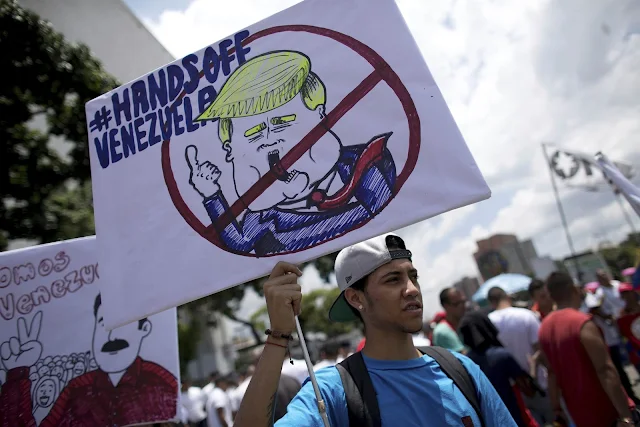When asked about the report, a National Security Council spokesman said the U.S. will consider all options to help restore Venezuela's democracy.
 |
| A government supporter holds a placard featuring a caricature of President Donald Trump during a demonstration in Caracas, Venezuela. |
BOGOTA, Colombia — As a meeting last August in the Oval Office to discuss sanctions on Venezuela was concluding, President Donald Trump turned to his top aides and asked an unsettling question: With a fast unraveling Venezuela threatening regional security, why can't the U.S. just simply invade the troubled country?
The suggestion stunned those present at the meeting, including Secretary of State Rex Tillerson and national security adviser H.R. McMaster, both of whom have since left the administration. This account of the previously undisclosed conversation comes from a senior administration official familiar with what was said.
In an exchange that lasted around five minutes, McMaster and others took turns explaining to Trump how military action could backfire and risk losing hard-won support among Latin American governments to punish President Nicolas Maduro for taking Venezuela down the path of dictatorship, according to the official. The official spoke on the condition of anonymity because of the sensitive nature of the discussions.
But Trump pushed back. Although he gave no indication he was about to order up military plans, he pointed to what he considered past cases of successful gunboat diplomacy in the region, according to the official, like the invasions of Panama and Grenada in the 1980s.
The idea, despite his aides' best attempts to shoot it down, would nonetheless persist in the president's head.President Trump: "We have many options for Venezuela, including a possible military option if necessary" https://t.co/EIPUTM5T5D— NBC News (@NBCNews) August 11, 2017
The public remarks were initially dismissed in U.S. policy circles as the sort of martial bluster people have come to expect from the reality TV star turned commander in chief.
But shortly afterward, he raised the issue with Colombian President Juan Manuel Santos, according to the U.S. official. Two high-ranking Colombian officials who spoke on condition of anonymity to avoid antagonizing Trump confirmed the report.











0 Comments:
Post a Comment